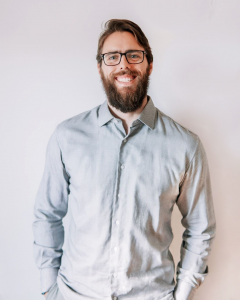Please tell us about your career pathway to date (positions and institutes).
I was recruited to the University of Alberta in Edmonton, Canada to play Canadian rules football, completing an undergraduate degree in the Faculty of Kinesiology, Sport, and Recreation. Near the end of my degree, I fell in love with research during a research practicum in the Physical Activity and Diabetes Laboratory under the supervision of Dr. Normand Boule. Based on my research interests, Dr. Boule introduced me to Dr. Valerie Carson. Under the supervision of Dr. Carson I have completed my MSc and am nearing the end of my PhD in the Behavioural Epidemiology Lab at the University of Alberta.
How would you briefly describe your current research/job to someone who is not familiar with your field of study/work? What is your main research interest?
Depending on how unfamiliar the person is, I start by saying I study physical activity in children under the age of 5 using research grade Fitbits. If that registers interest, I will tell them I also study sleep and sedentary behaviours. If they are still with me, I will start going off about how much I love coding and analyzing data until they politely make an excuse to leave or react with visceral disgust from being ambushed in polite conversation with the word “statistics”.
My main research interest is understanding children’s movement behaviours (i.e., sleep, sedentary behaviour, and physical activity) with an emphasis on accelerometers and various analytical techniques. Specifically, I have used the framework for Viable Integrative Research in Time-Use Epidemiology (VIRTUE) to map out research questions in my dissertation that address: 1) Methodological research in time-use epidemiology (i.e., data measurement, processing, and analysis), 2) Outcomes of health-related time-use compositions, 3) Time-use compositions (i.e., optimal balances and prevalence), and 4) Correlates of optimal time-use.
What are the main barriers you encounter/experience when conducting research, or what information/skills do you lack to conduct high quality research?
Lacking seems like there is a setpoint, with no room for growth. Lacking information or skills is frustrating; gaining information and improving skills is very rewarding. But this section is probably for tangible examples not me spouting my mission statement on self-improvement.
One skill that I am constantly improving is writing. Writing was initially a great source of frustration, but over time I have grown to really enjoy the process! Crafting raw ideas and findings into concise and convincing arguments is cathartic, perhaps owing to our basic need of feeling understood. That said, even though I enjoy the process of improvement I still have not reached my desired proficiency. So, I need to be vigilant about dedicating time to writing often–Is it true that if you don’t use it, you lose it?? I have also grown to enjoy literature on writing, like Joshua Schimel’s “Writing Science”, which approaches writing a good scientific paper like telling a good story.
What could help you as a student/ECR to further develop/grow in your current position?
I am transitioning from a PhD student to postdoctoral fellow, which is a great time to continue to learn the nuances of academia. It is also a critical time to prepare for my future academic career. Something that will help me during this time is continuing to seek guidance or mentorship from an array of researchers at various stages in their careers. Classic stats nerd: gather robust data and try to identify correlates for a successful career trajectory.
What do you think will be the next most important development in the nutrition and/or physical activity field?
I don’t know if it is the next big thing, but I feel it is imperative to remain relevant to the end users of my research—young children and their parent’s. The current pandemic has thrust many parents into the role of home-school educators, that are being told to stay home as much as possible. How can parent’s maintain positive mental health and keep their children: active, entertained beyond screen time, and on a routine promoting good sleep hygiene? Especially for those with limited resources and physical space.
Beyond the pandemic, I am interested in tying my future research to climate change issues. For instance, promoting opportunities for children to have meaningful outdoor activities that set them up for both lifelong healthy movement behaviours and environmental stewardship.
Get in touch with Nicholas Kuzik via email: [email protected] or follow him on Twitter @Nicholas_Kuzik


